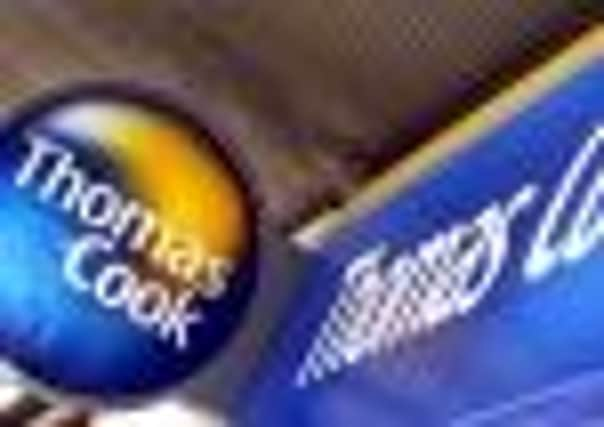Martin Flanagan: Investors flee in the face of Thomas Cook’s travails


Three profits warning and an ousted chief executive so far this year had already slashed 80 per cent off the tour operator’s shares. The possible coup de grace came yesterday when the firm revealed it was in talks with its major lenders after being in danger of breaking its banking covenants.
Cue a further 75 per cent wiped off the already battered stock yesterday. The company’s trading performance has been poor for a long time. There have been some self‑inflicted wounds, but Thomas Cook has also been hit by the cancellation of some 160,000 holidays in turbulent Egypt and Tunisia.
Advertisement
Hide AdAdvertisement
Hide AdShares in the company slumped to just 10.2p yesterday, valuing a business that was once in the blue‑chip FTSE 100 index at less than £100 million.
They are unlikely to recover quickly as there is little visibility on Thomas Cook’s future earnings, and there must be a substantial risk of a highly dilutive issue of new equity to try and patch up the company’s finances.
The group’s credibility with the market, lenders and customers has been badly hit, and this is compounded by a poor trading backcloth.
Where to now for investors? I certainly wouldn’t advise buying on the current share price weakness because it is just as likely things could get worse.
Trading conditions across the mass holidays market have deteriorated in the economic downturn far faster than most pundits expected. The outlook for the sector looks bumpy.
It is now legitimate to wonder whether Thomas Cook, still without a permanent chief executive since Manny Fontenla‑Novoa fell on his sword amid the gathering crisis at the group last August, can survive.
On the plus side, the group still has robust businesses in Scandinavia and Germany. But one wonders whether the whole is significantly less than the sum of the parts, and the company could be a candidate for serious retrenchment and radically reduced aspirations in the holidays market.
Pantomime performance but they’re hanging on
SALES growth at Mitchells & Butlers may be slowing and underlying group profits down a bit. But given the extended pantomime of activist shareholder pressure and management change at the pubs group it is something of an achievement to be hanging in there at all.
Advertisement
Hide AdAdvertisement
Hide AdBillionaire currency trader Joe Lewis, still the largest single shareholder, with nearly a quarter of the shares, has walked away for now from any takeover of the group and the search for yet another chief executive goes on.
But, given the difficult trading backdrop pub restaurants are up against as well as M&B’s bespoke boardroom problems, the numbers put out yesterday were not bad.
In these cash‑conscious times for consumers, low single‑digit sales growth and keeping a profits fall to under 8 per cent, as M&B has done, shows management has kept some focus amid all the left‑field distractions.
Clarity is the requirement in executive pay saga
THE independent High Pay Commission says executive pay needs to be radically simplified to redress some of the inequalities with the shopfloor. Bravo.
A good start would be having a basic salary for directors and one clear bonus scheme, a mixture of shares and cash, with unambiguous targets for the bonus to be activated.
At present, going into a company’s annual report there is a bewildering blizzard of short-term incentives and long-term incentive schemes, with various different targets and a sense that what executives don’t get on the swings they will get on the roundabouts.
Quite simply, many corporate bonus schemes appear too often to be exercises in obfuscation of the gravy train. The commission found that for some top executives remuneration has surged 40 per cent in the past 30 years. Average wages are just three times higher. Simplifying bonus schemes would be a good way to get a fairer remuneration landscape.